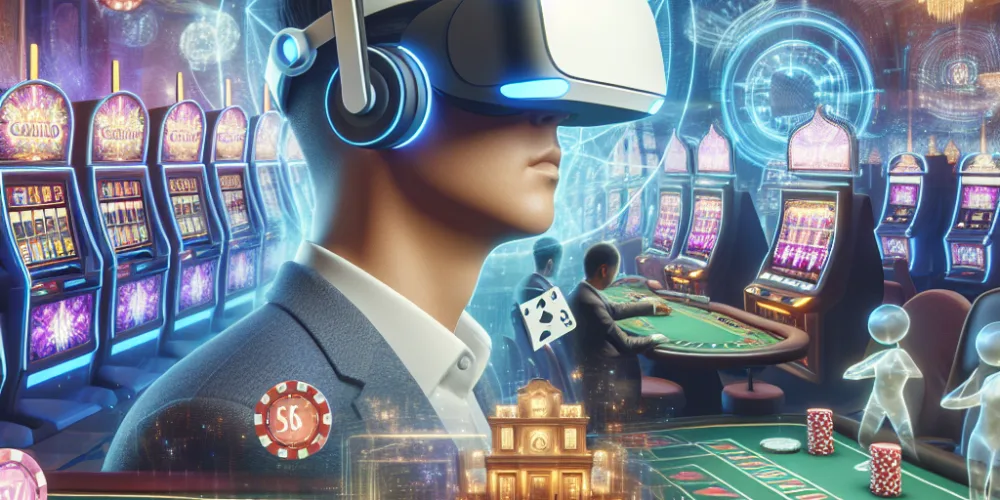In recent years, the gaming industry has witnessed significant growth and transformations, particularly with the advent of technology such as Virtual Reality (VR). While VR has predominantly been associated with video gaming, its integration into the casino sector is revolutionizing the way players engage with gambling activities. The trend of virtual reality casinos is rapidly gaining traction, offering a novel and immersive gambling experience that mimics the feel of a real-life casino.
Virtual reality technology in casinos allows players to enter a fully interactive digital environment where they can play games like blackjack, poker, slots, and roulette in a way that feels incredibly real. This immersive experience is not just about playing; it’s about feeling the ambiance of a casino – the sounds of slots machines, the chatter of other players, and the texture of cards and chips in your hands, all from the comfort of your own home.
The Technology Behind Virtual Reality Casinos
VR casinos operate using a combination of virtual reality hardware, such as VR headsets, and gaming software that creates a 3D casino environment. The leading VR headsets used include Oculus Rift, HTC Vive, and Sony PlayStation VR. These headsets provide high-definition visuals and responsive head-tracking, enhancing the immersive experience for users.
Game developers are increasingly creating VR versions of popular casino games. These games are designed with detailed graphics and interactive features, allowing players to choose actions just as they would in a real casino. For instance, in a VR poker game, players can look around the table, interact with opponents, deal cards, and even engage in side conversations.
The Appeal of VR Casinos
The allure of VR casinos lies in their ability to provide a realistic and interactive gaming environment that is accessible 24/7. They eliminate geographical and mobility barriers, making casino games accessible to a broader audience. Players who are unable to visit physical casinos due to distance, disability, or other constraints can now enjoy a near-authentic casino experience at home.
Moreover, VR casinos are becoming a social platform. They allow players to interact with each other in real-time, which adds a social dimension absent in traditional online casinos. This feature is especially appealing in times such as these where social interaction is more limited. Therefore, VR casinos not only provide entertainment but also a means of social interaction.
Market Growth and Future Prospects
The virtual reality market, including VR gaming, is anticipated to grow significantly in the next few years. According to a report by Grand View Research, the global VR market is expected to reach approximately $62.1 billion by 2027, expanding at a compound annual growth rate of 21.6% from 2020 to 2027. Casinos are keen to tap into this growth by investing in VR technology to attract the next generation of gamblers.
Furthermore, as technology advances, the future of VR casinos could include more personalized and interactive elements. We might see AI-driven dealers, more advanced social interaction options, and even VR casino tournaments. As VR technology becomes more affordable and accessible, more and more casino operators will likely adopt this technology, enriching their offerings and enhancing user engagement.
Challenges and Considerations
Despite the promising prospects, the integration of VR into casino gaming is not without challenges. Issues such as technological accessibility, regulation, and potential gambling addiction are concerns that need addressing. Ensuring secure and fair play in VR casinos is also paramount to protect users’ data and prevent fraud.
Moreover, there is a need for responsible gambling measures to be adapted to VR environments, as the immersive and realistic nature of VR could potentially increase the risk of gambling addiction. Operators need to implement strict policies and tools to promote responsible gambling and provide support for users who may be at risk.
Conclusion
VR casinos are setting a new trend in the gambling industry, providing an engaging and novel experience that brings the thrill of a casino into the virtual realm. As this technology continues to evolve, it holds the potential to transform the gambling landscape profoundly. Whether you’re a seasoned gambler or a curious newcomer, the world of VR casinos offers a fascinating glimpse into the future of entertainment, combining the excitement of gaming with the cutting edge of technological innovation.

Karine Gomez is an enthusiastic writer and avid gamer with a particular love for PlayStation and casino gaming. Her deep knowledge of gaming trends and casino dynamics makes her articles both informative and engaging. Karine’s passion for PlayStation games and her firsthand experience with casino play shine through in her writing, offering readers authentic insights and valuable tips.

